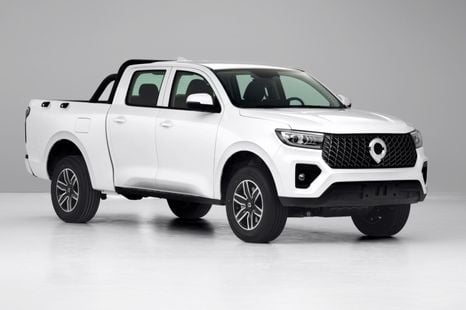

Damion Smy
GWM Cannon PHEV uncovered as BYD Shark 6 rival, Australian launch under consideration
6 Hours Ago
The Ranger is staking its claim to be the king of the dual-cab utes, and the Wildtrak V6 is the crown jewel in the regular Ranger line-up.
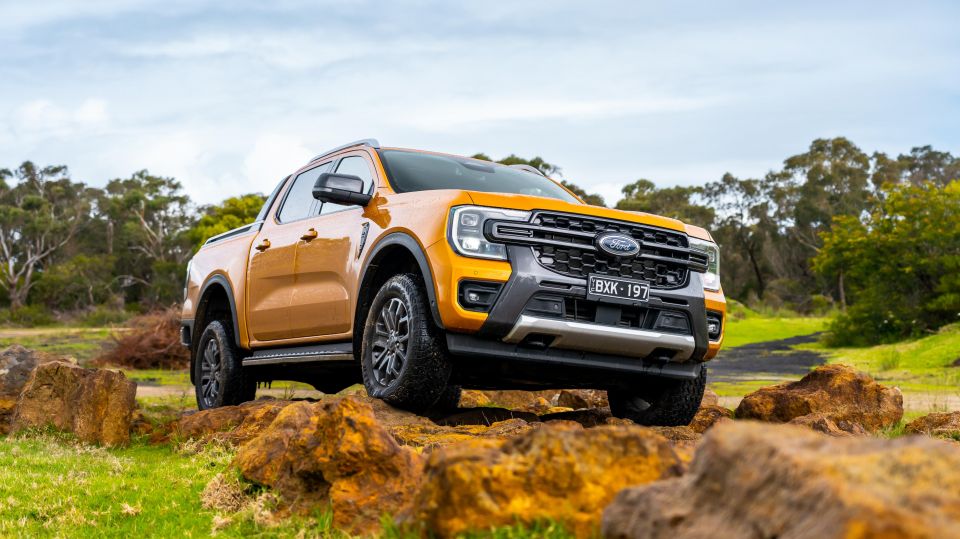
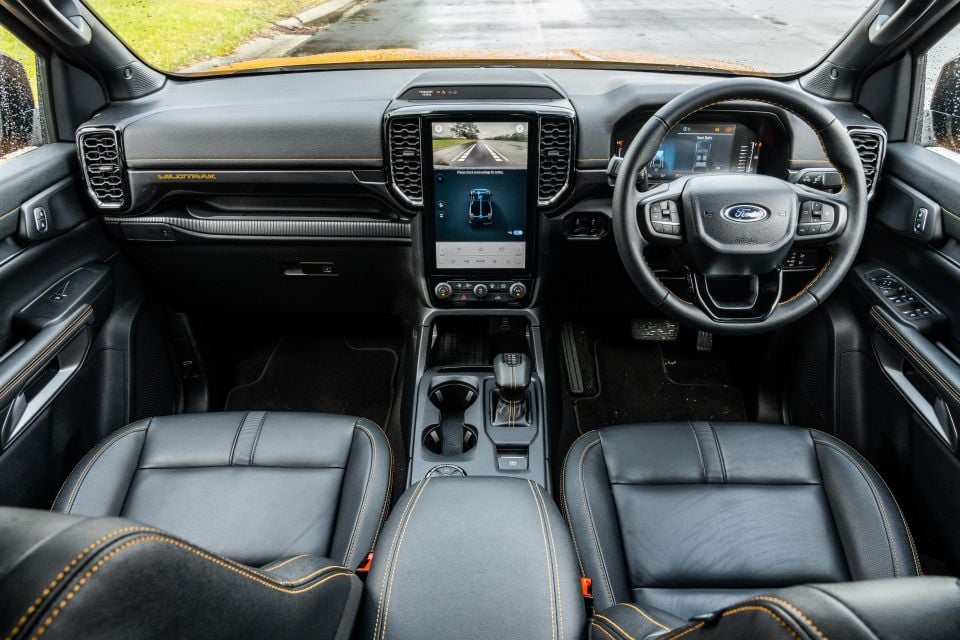

Quickly see how this car stacks up against its competition. Select any benchmark to see more details.
CarExpert brings reviews, research tools and trusted buying support together, guiding you from research to delivery with confidence.
The new Ford Ranger is one of the most talked about new cars in Australia, and it seems like the Wildtrak V6 is one of the models buyers are most excited about.
Wait times at the time of writing were around six months, the longest of any Ranger model short of the Raptor. People are clamouring to get their hands on the range-topping Ranger Wildtrak.
Expectations on top-end versions of modern dual-cab utes like the Ranger Wildtrak are high. Along with the ability to haul a load, they need to come with a full suite of active safety features, comfortable interiors, and four-wheel drive kit that’s simple enough to get amateur off-roaders to a muddy campsite without getting bogged.
It’s not an easy task, but the 2023 Ford Ranger Wildtrak is more than up to task.
With a sticker price north of $70,000 before on-road costs, the Ranger Wildtrak is a pricey truck. It’s $3000 more expensive than the Wildtrak Bi-Turbo, and $4000 more expensive than the Ranger Sport V6 sitting one rung below it in the line-up.
The equivalently-priced HiLux is the Rogue ($70,200) which is more off-road oriented, but doesn’t pack V6 power or offer the same level of luxury behind the wheel.
The Nissan Navara Warrior Pro-4X Warrior auto ($70,590) is similarly off-road oriented as the Rogue but with less interior luxuries again, while the Isuzu D-Max X-Terrain undercuts the Wildtrak at $64,990 drive-away.
2022 Ford Ranger Wildtrak
Prices exclude on-road costs

Buy your new car without the stress. It's fast, simple and completely free.
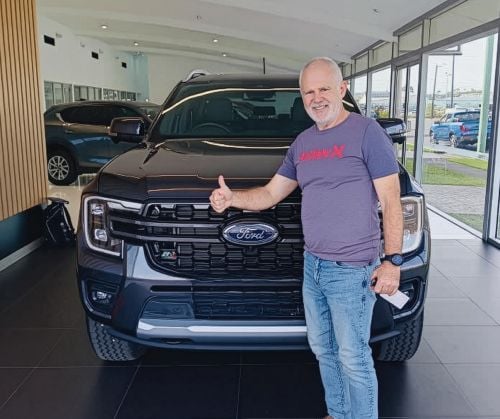
Great service from Travis and team, second time I have used this business would not hesitate to recommend them to anyone
Craig C.
Purchased a Ford Ranger in Sunshine Coast, QLD
CarExpert helped Craig save thousands on his Ford Ranger, now let us save you on your next new car.
Get your BEST priceThe new Ranger moves the game forward for dual-cab utes on the technology and comfort front.
With a tilting and telescoping wheel, well-padded seats that accomodate tall drivers, and plenty of storage up front, it’s easily the best ute out there if you’re planning to spend long stints on the highway.
The leather trim, seat heaters, and power adjustment elevate the Wildtrak above its rivals, as do the orange stitching and Wildtrak embossing.
As the range-topping model, the Wildtrak gets a 12-inch vertical touchscreen running the latest Sync 4 software.
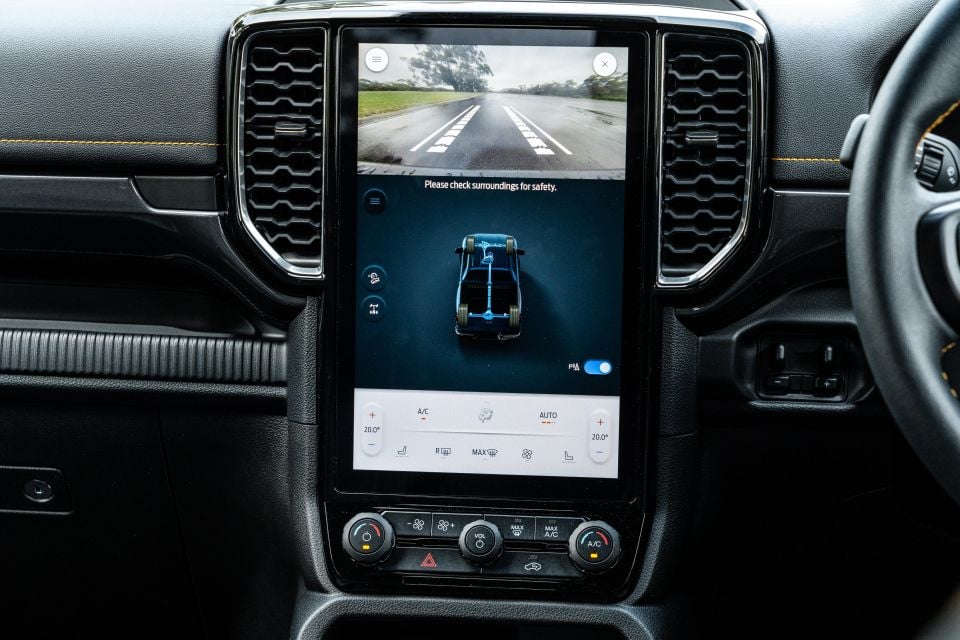
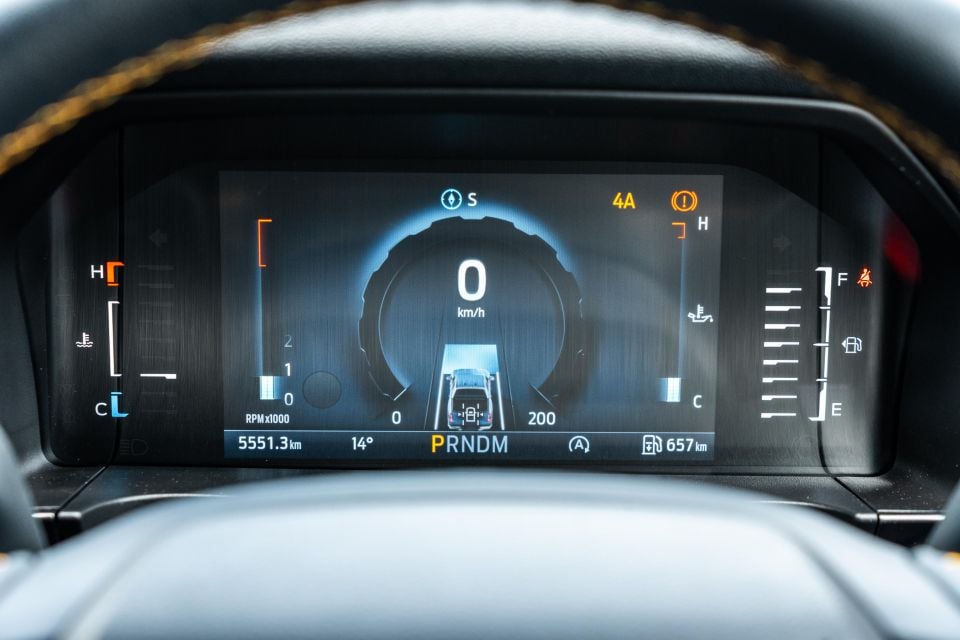
The software looks and feels very modern, and Ford has retained some physical buttons for frequently-used climate functions, so it’s easy to fiddle with the temperature on the move.
The menu structure is logical, and the amount of screen real estate means key information isn’t buried. It’s possible to have your mapping, radio preferences, and climate information on display all at once, for example.
Wireless Apple CarPlay connected flawlessly for us, but on longer trips we used USB-C to preserve battery. A bit more processing power still wouldn’t go astray though; the screen sometimes lags when you’re hopping between functions.
The digital dashboard is simple and easy to read on the move, but it’s quite basic relative to the 12-inch unit on offer in the Raptor and Everest Platinum. Given the Wildtrak’s price, it really should also get the fancier cluster.
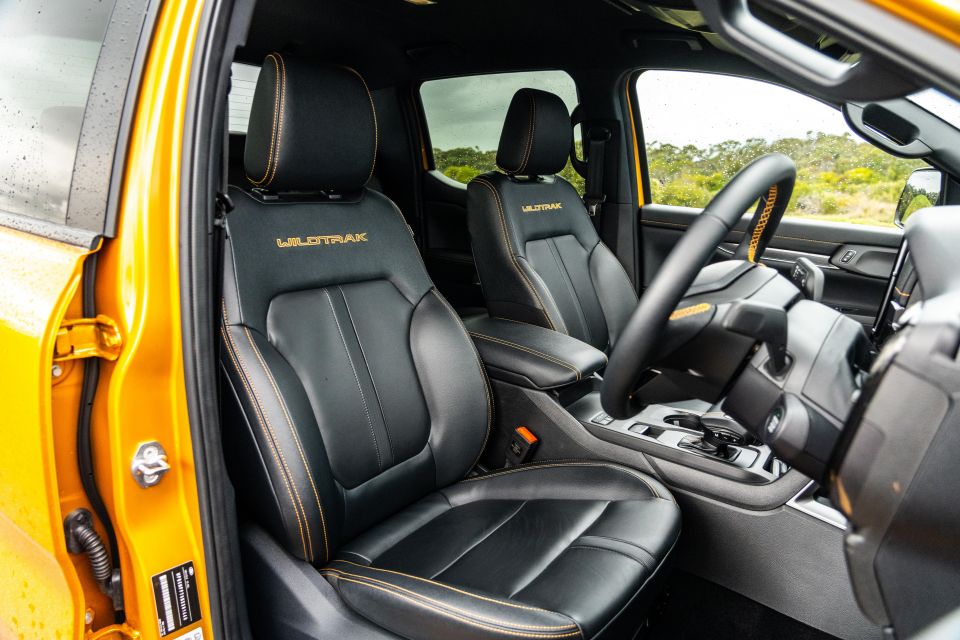
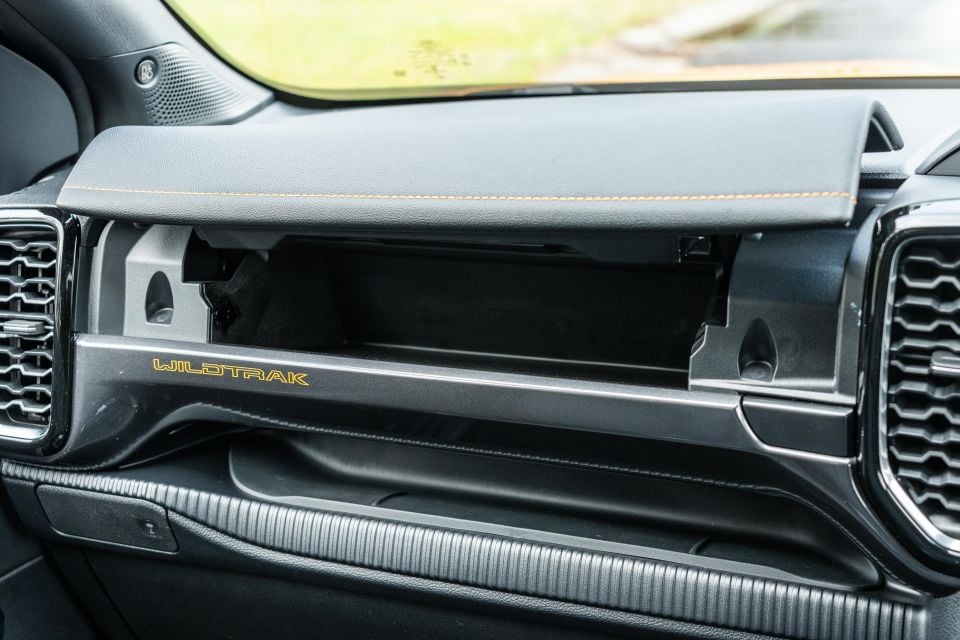
FordPass Connect is standard on the Ranger, and allows owners to lock or unlock and remotely start their car, check fuel levels, find the car, activate the exterior lighting, or even check the indicators on your trailer are working.
It feels like Ford has really thought about how to value-add with its app in the Ranger, rather than just translating passenger car technology into a vehicle with a different set of goals.
Storage space around the cabin is plentiful. The central bin is deep, the door pockets have plenty of room, there are two cupholders on the transmission tunnel, and the slot beneath the dashboard is huge. The slot ahead of the gear selector is perfect for a large McDonalds fries – no chip crisis here.
The extra pop-up glovebox on the passenger side (it’s not standard range-wide) is handy, while the overhead switch console on our tester (part of the Premium Pack) is a neat way to save owners who plan to add powered accessories from having to MacGyver their own switches into the cabin.
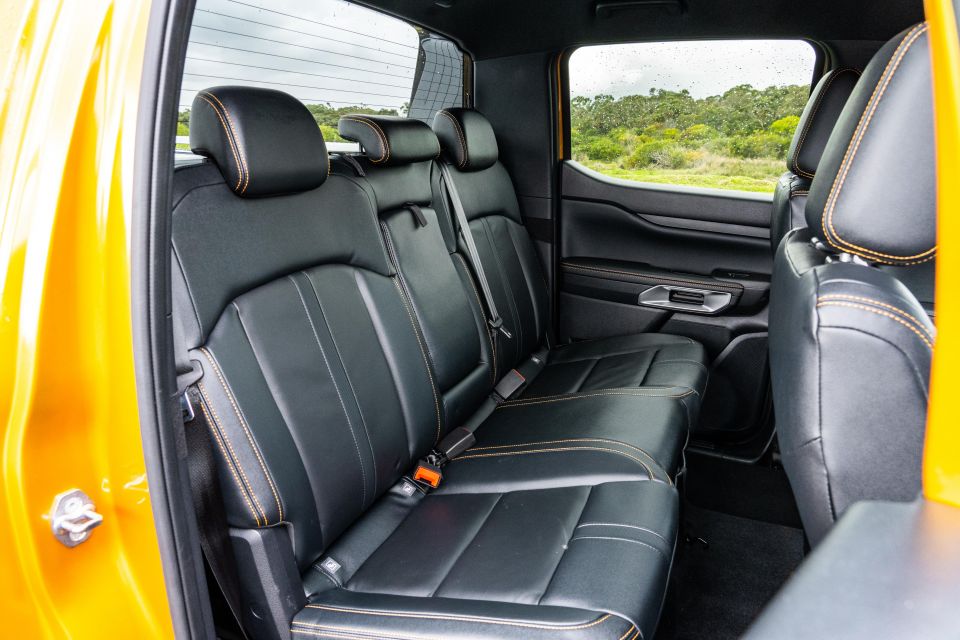
Rear seat space is fine, but doesn’t feel like much of a step on from what was previously on offer. Leg- and headroom are both acceptable, and the bench is broad enough that three tradies will be able to travel on short journeys without wanting to kill each other afterwards.
The inclusion of air vents is good, the fact Ford has fitted a 12V slot but no USB ports on the rear of the transmission tunnel feels like a missed opportunity.
The 12V is versatile when it comes to accessories, but you’ll need to plug in a dongle to charge iPads back there.
Along with the requisite ISOFIX and top-tether child seat points, the Ranger features a fold-down central armrest, damped rear grab handles, and storage bins beneath the seat bases.
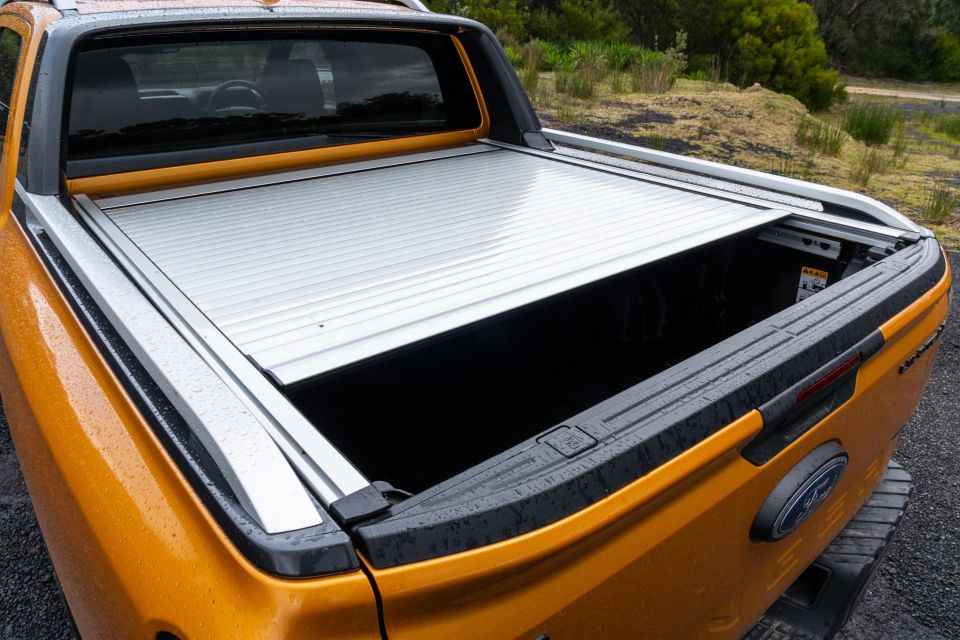
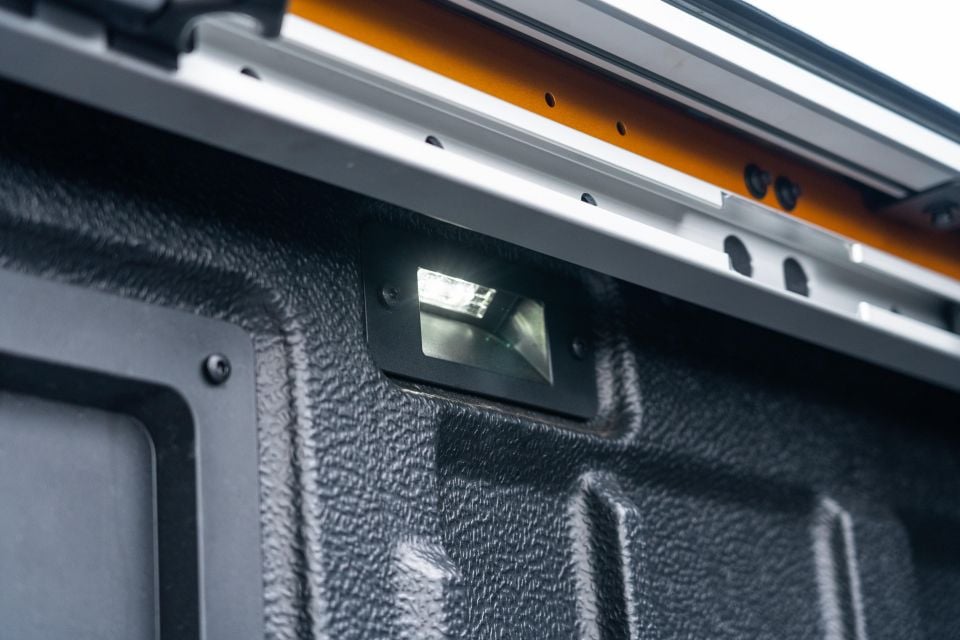
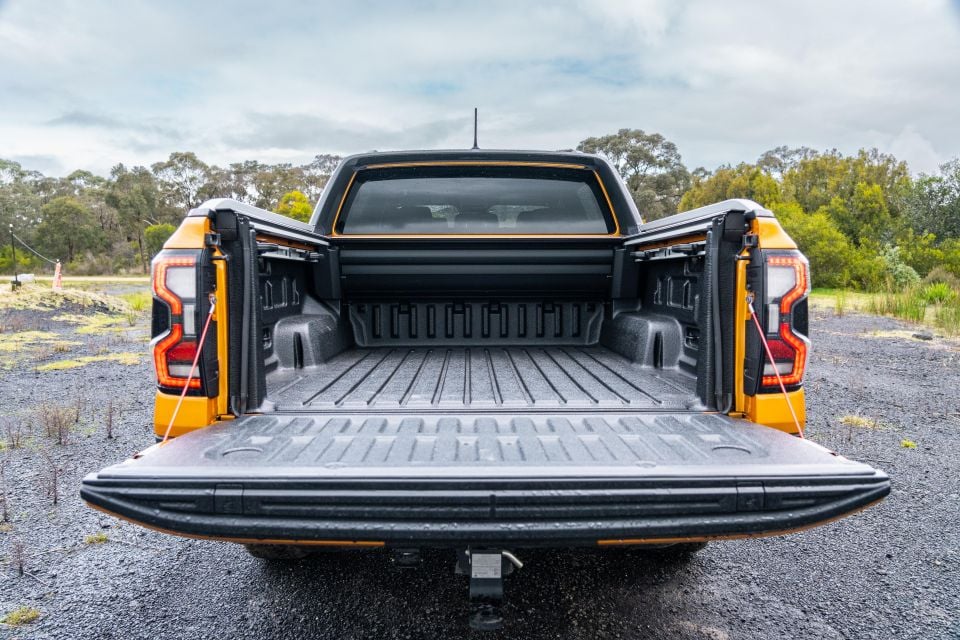
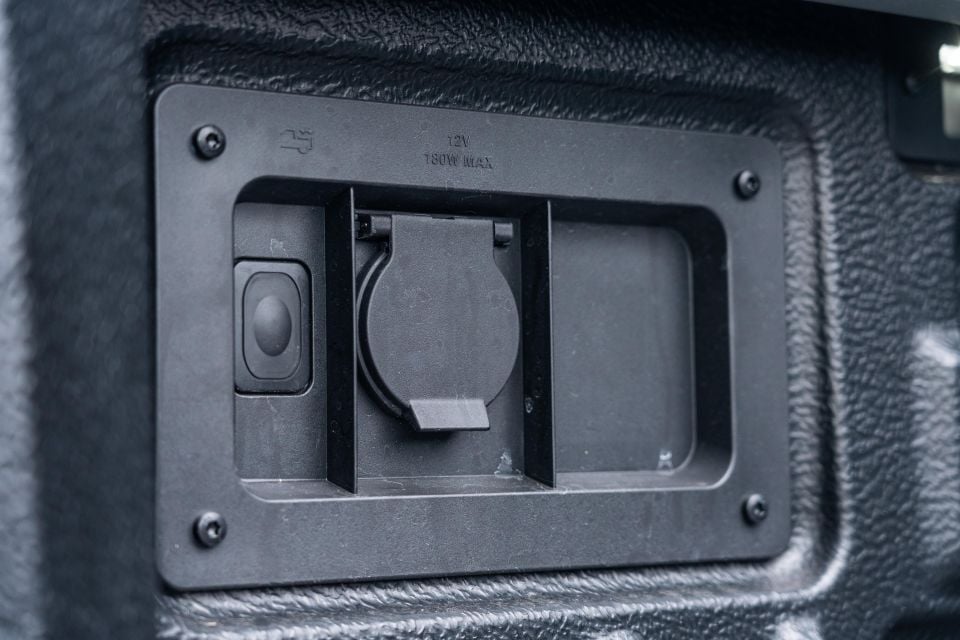
Dual-cab Ranger models have a wider tub than before, billed as sufficient to flat-stow a 1200mm x 800mm pallet.
It’s simpler to access, with sturdy box steps fitted just behind the tyres. At 100kg, my weight didn’t make them flex.
The counterbalanced tailgate (with mounting points for vices and even a pre-drawn ruler) can be lifted with a finger, there are six tie-down hoops in the bed, and the box sides have structural attachment points for canopies pre-fitted.
The powered roller cover on the Wildtrak can be operated from the key. Although it eats into load space, it does make it easier to throw things into the tray if you’ve got your hands full with kids, bags, or whatever it is you’re planning to load.
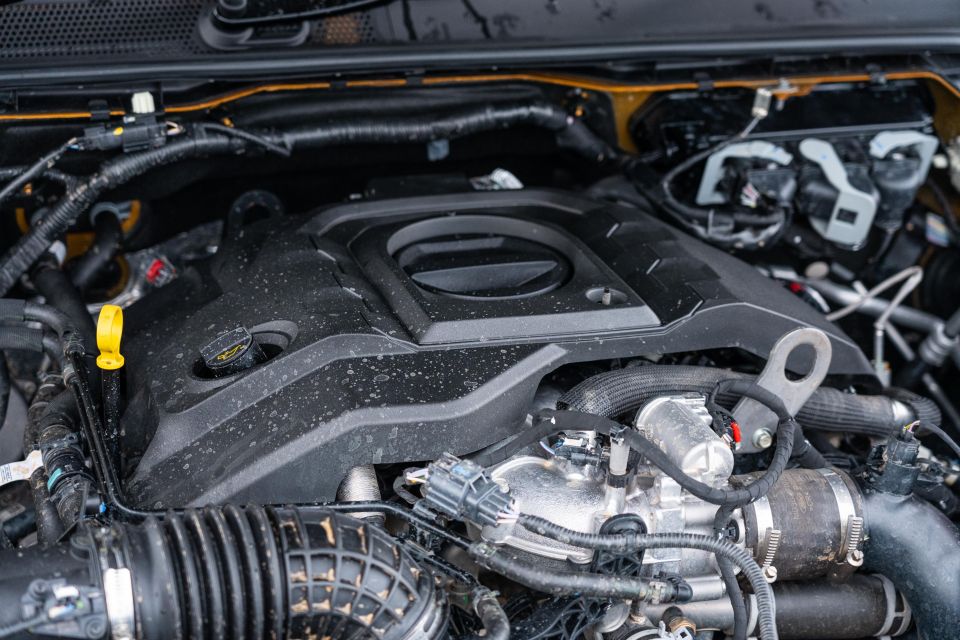
Two engines are offered on the Ranger Wildtrak. The cheaper option is a familiar 2.0-litre Bi-Turbo four-cylinder diesel producing 154kWand an unchanged 500Nm.
The 3.0-litre V6 turbo-diesel engine fitted to our tester produces 184kW and 600Nm.
It’s mated to a 10-speed automatic, and sends power to the road through a four-wheel drive system capable of 2H, 4H, and 4L operation – but also a 4A mode that allows for all-wheel drive on the tarmac, regardless of conditions. That will endear the V6 Ranger to plenty of customers.
Claimed fuel economy for the V6 is 8.4 litres per 100km on the combined cycle, and the ute has an 80L fuel tank. We saw 8.5L/100km over 680km with a skew to highway driving.
Payload in the Wildtrak is 951kg, and braked towing capacity is 3500kg. Its GCM is 6400kg, and its GVM is 3280kg. Tare weight is 2335kg.
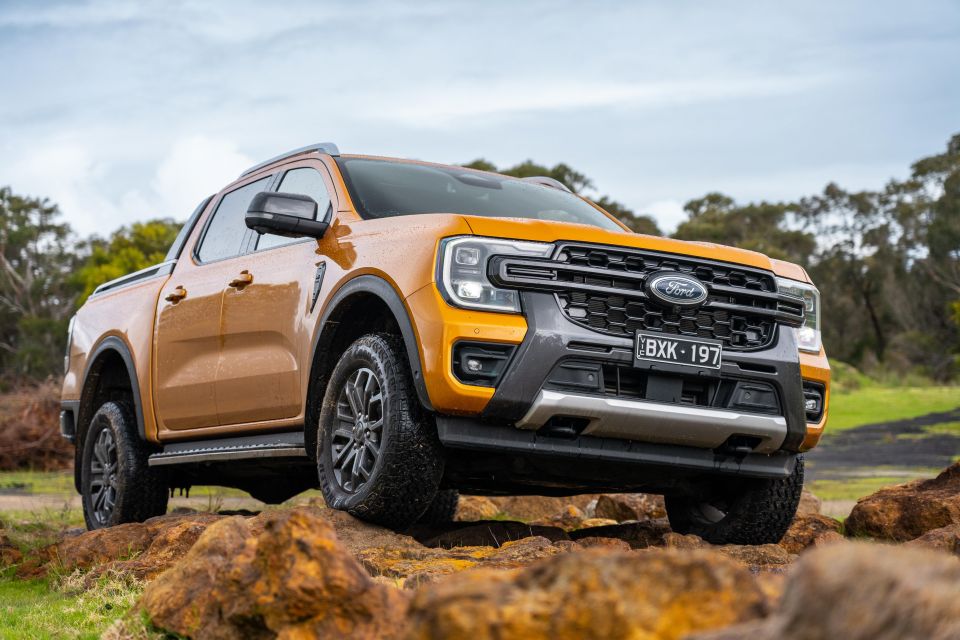
The V6 engine in the Wildtrak is a smoother, more effortless mover than any of its four-cylinder rivals.
The engine (dubbed Lion) traces its roots to Land Rover, and a version of it actually featured in the Ford Territory diesel. It’s new to the Ranger, but an iteration has also appeared in the full-sized F-150 pickup sold in the USA.
With 30kW and 100Nm more than the Bi-Turbo, it’s the torquiest dual-cab ute on offer in Australia ahead of the outgoing Volkswagen Amarok.
That plays out with a satisfying surge of performance from below 2000rpm when you lean on the accelerator, and better in-gear response at highway speeds. It doesn’t need to work as hard, and when you need it to dig deep you’re immediately aware there’s a higher ceiling on what it can do.
Driven back-to-back with the 2.0 Bi-Turbo it immediately sets itself apart with more muscular performance; the sort of performance that will immediately endear the V6 to people who live life with a heavy trailer hitched to their ute.
Wondering exactly how much faster it is? If you haven’t already, have a look at the video sitting above. Even if you aren’t planning to frequent the drag strip, the effortless feeling of the six makes for a more luxurious feel than the harder-working four.
Beyond the extra punch on offer, the V6 sets itself apart with proper full-time four-wheel drive. Rather than the part-time four-wheel drive system in the Bi-Turbo, which shouldn’t be driven in 4×4 on sealed roads, the system in the V6 can be used all the time.
You can set it in 4A and forget for normal driving, and enjoy all-wheel drive traction in wet conditions without the risk of your differentials binding. Utes on all-terrain tyres are notoriously skittish on wet tarmac, so the added security of a full-time four-wheel drive system brings benefits in a wide range of conditions.
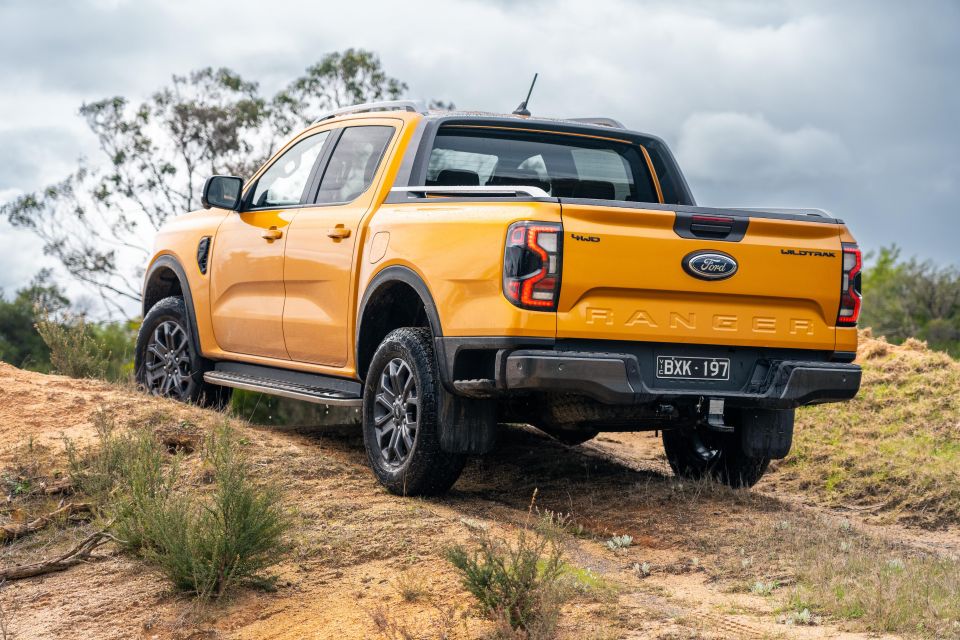
Only the Amarok offers the same functionality at the top end of the market, although the less expensive Mitsubishi Triton also offers its own take on full-time four-wheel drive.
I drove the Wildtrak (unladen) to Apollo Bay via the wet, leaf-littered roads through the Otways and it felt rock solid the whole way – but even in the city having all-wheel drive is beneficial, given most utes in 2H will light up the rear tyres coming out of wet side streets.
While the core ladder frame, as well as the coil front and leaf rear suspension setups are familiar, Ford Australia engineers have made the track 50mm wider and moved the dampers outboard, theoretically cutting down on hopping and bouncing when lightly laden.
With two people and luggage on board, the Wildtrak is impressively settled at the rear in particular.
You don’t get the sense the tail is wagging when you hit bumps at speed, and occupants aren’t jiggled around relentlessly. The Ranger has always been one of the best dual-cab utes to drive unladen, and the latest Wildtrak model is no exception.
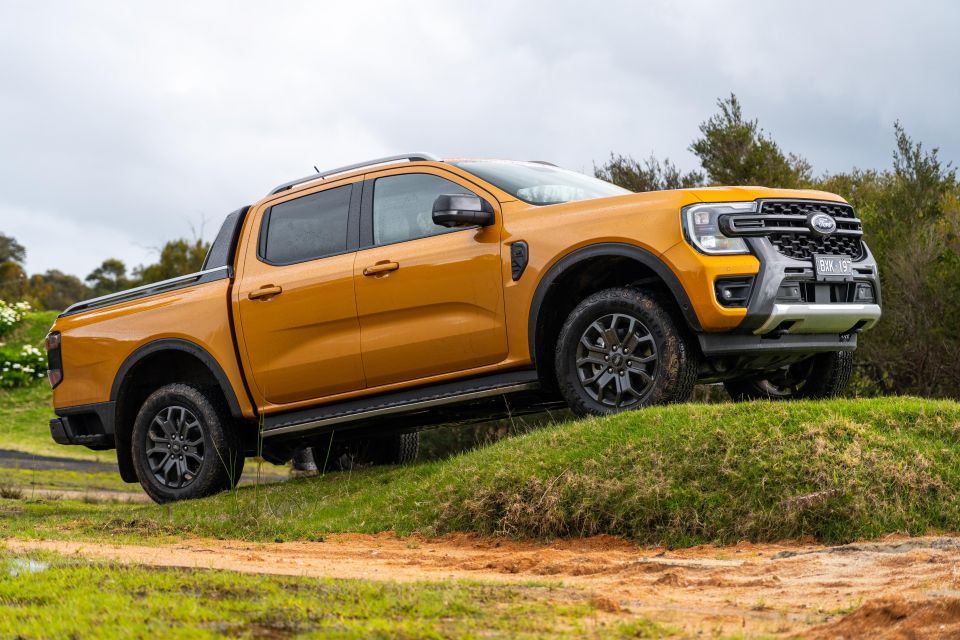
It’s rock solid over the sort of washboard gravel roads prevalent in remote parts of Australia, and does an excellent job soaking up the sort of pitted streets prevalent in the less remote bits. On coarse-chip roads it’s impressively hushed in the cabin, too.
The Wildtrak can’t escape its ladder-frame chassis and payload carrying capability entirely, though. It’s busier than the related Everest 4×4 on the highway, for example, and never settles entirely where SUVs will.
If you need a tray on the back of your car it’s excellent, but utes still aren’t able to match non-commercial vehicles for comfort.
Like its predecessor, the new Ranger features light steering and decent all-round visibility. It’s one of the easiest utes to pilot in town, and the electric power steering system feels more direct than before.
In the old model you needed to twirl, twirl, and twirl the wheel some more at low speeds; the new model requires smaller inputs.
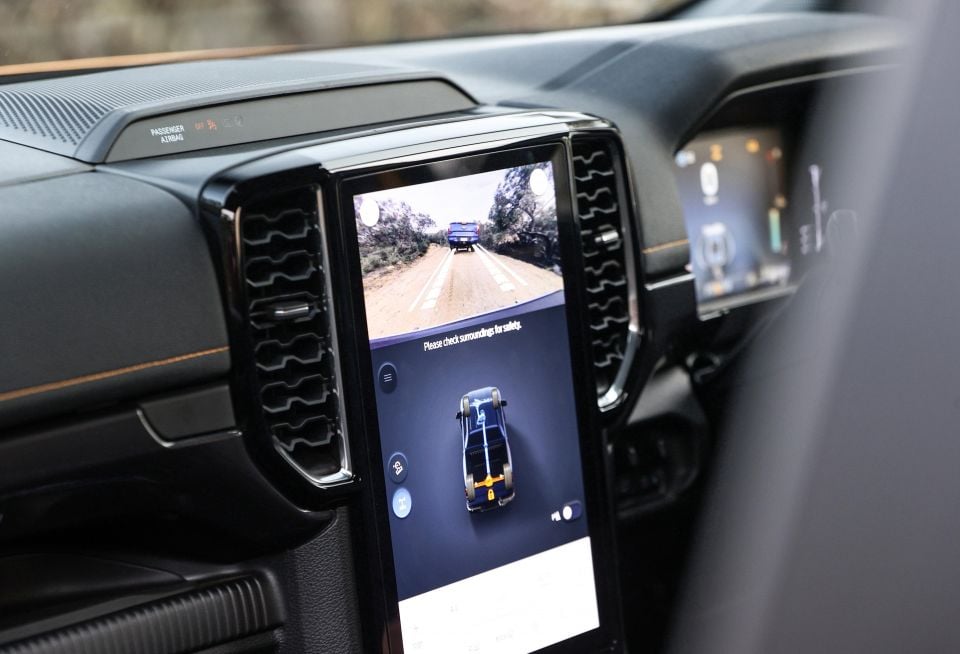
The smooth idle start/stop system makes a difference in the city, although plenty of owners will no doubt turn it off immediately.
It’s worth noting the reversing camera is a magnet for mud and spray, so it’s worth carrying a cloth in the cabin if you rely on it and frequent mucky roads.
That’s a shame, because the Wildtrak’s surround-view camera system is otherwise a handy addition that makes parking a long, wide car easier in tight spaces.
The Isuzu D-Max was the first ute to really put a full suite of driver assists front and centre, but the Ranger’s systems are arguably better calibrated. The lane-keeping assist keeps you between the white lines on the highway and holds the car nicely in its lane in tricky conditions (check 31:30 in our Ranger Wildtrak video).
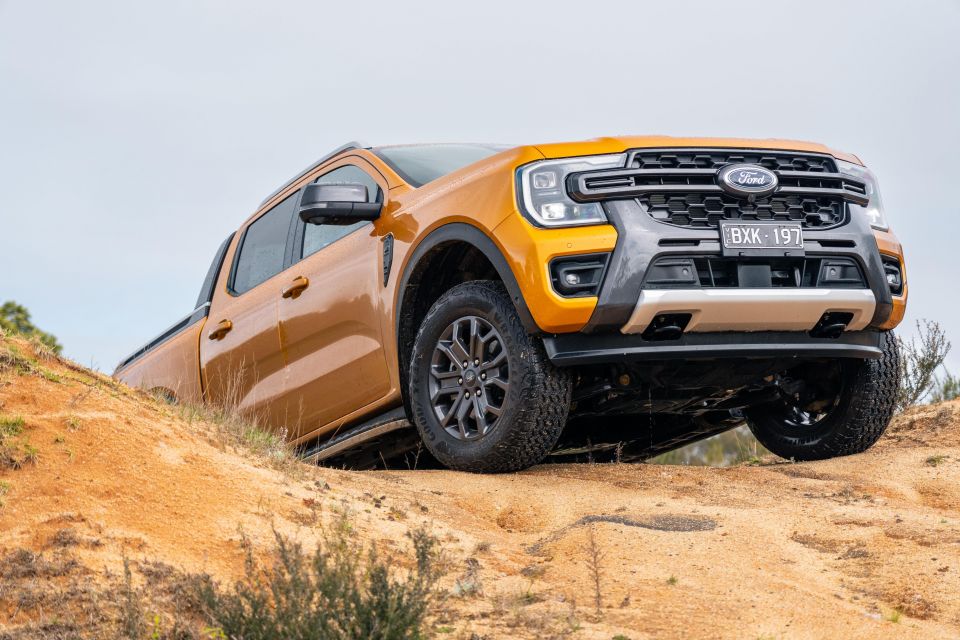
Our experience with the Ranger off-road so far has proven it’s an idiot-proof way to go into the wilderness.
Any inputs to the off-road dials on the transmission tunnel bring clear, bright animations on the instrument cluster or central screen to keep less experienced drivers abreast of what’s happening, and the four-wheel drive system switches modes quickly.
Hill descent control keeps an iron grip on your momentum and doesn’t grind or graunch like older systems, and the surround-view camera allows you to leave the front camera on while you’re off-roading, and presents a high-resolution view of the trail ahead featuring guidelines.
Even without it, the bluff front end is quite easy to place.
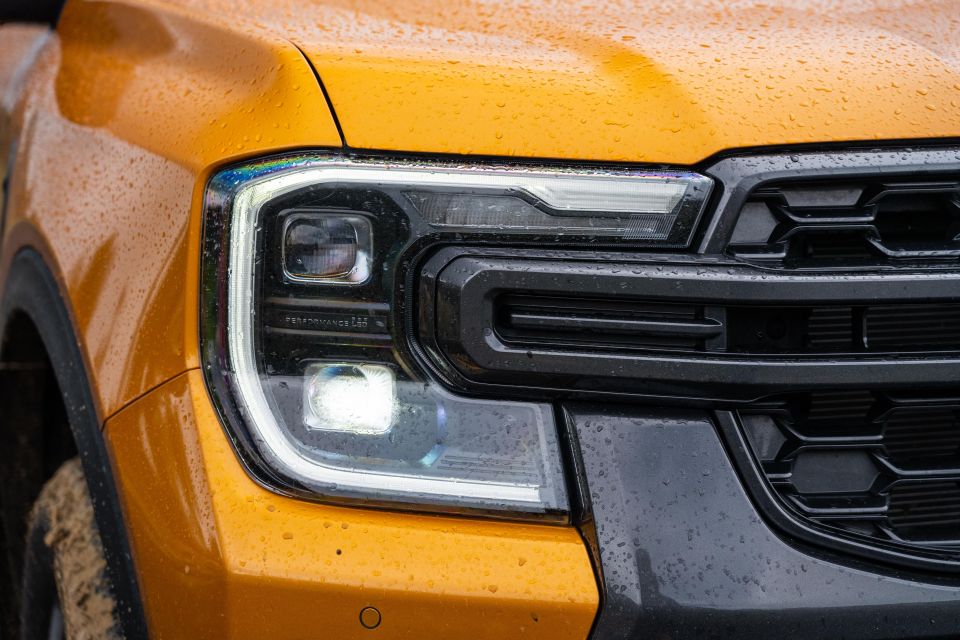

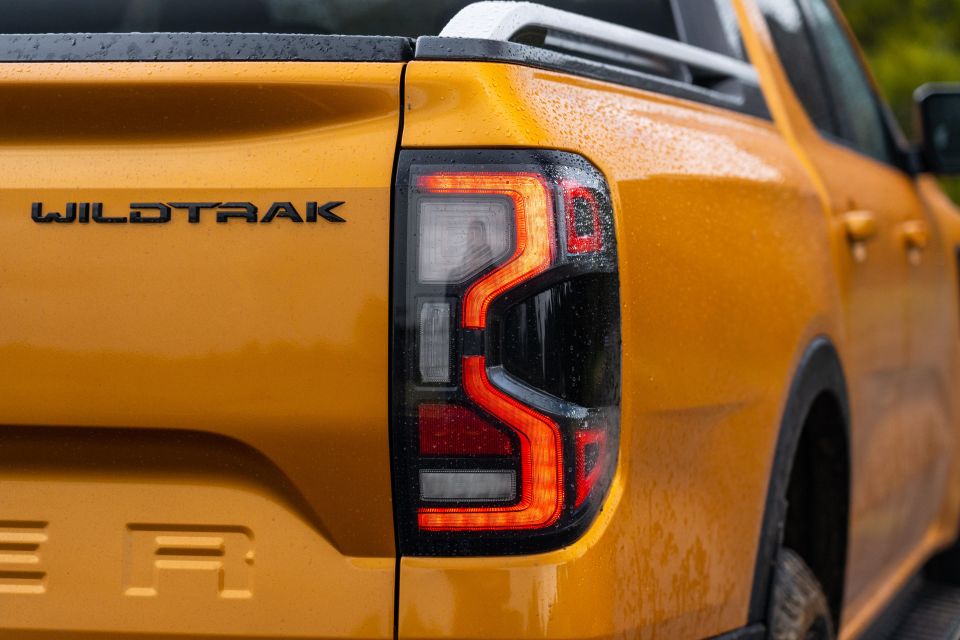

Ranger Wildtrak highlights:
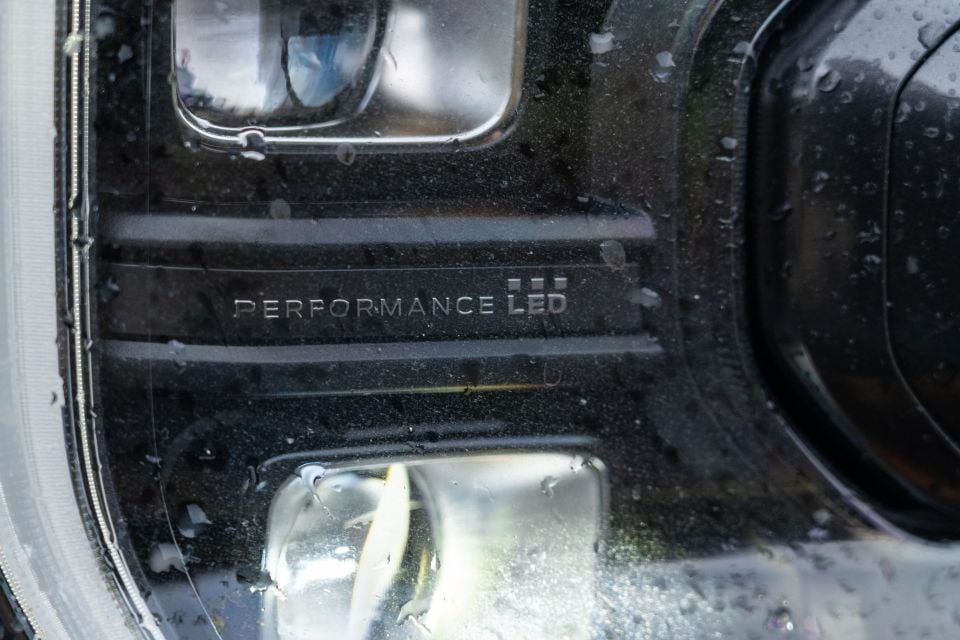
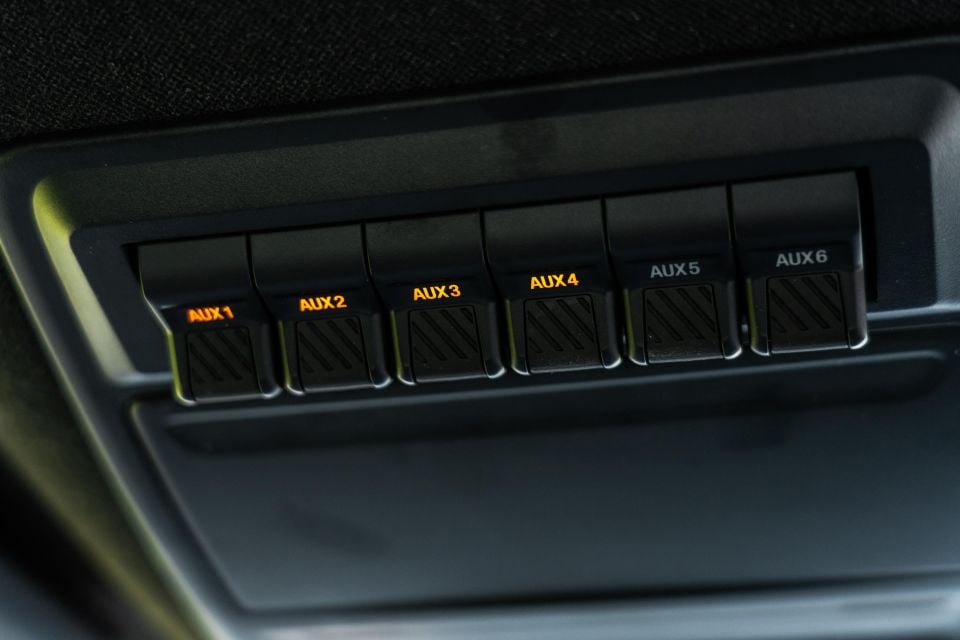
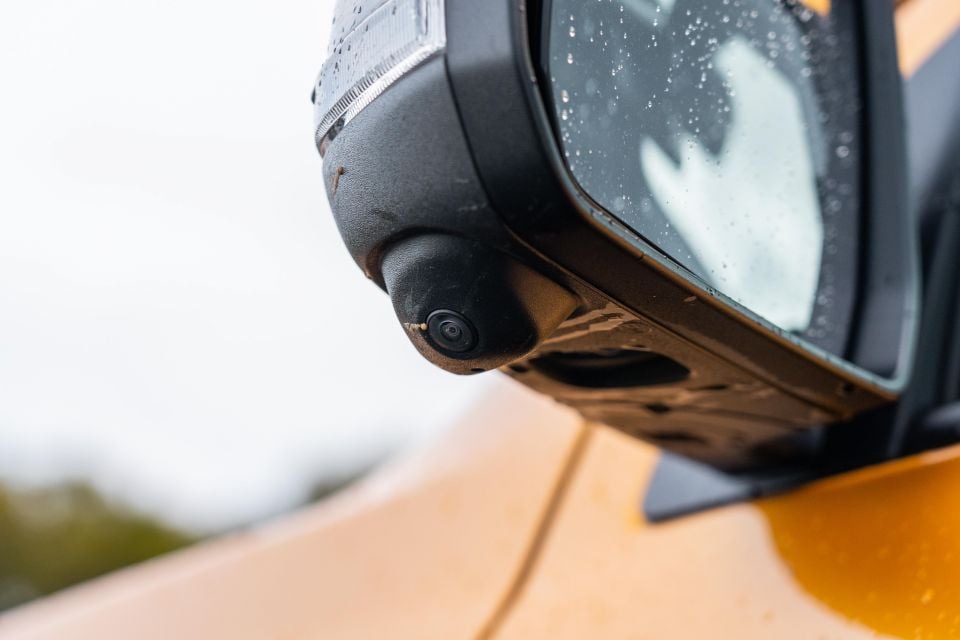
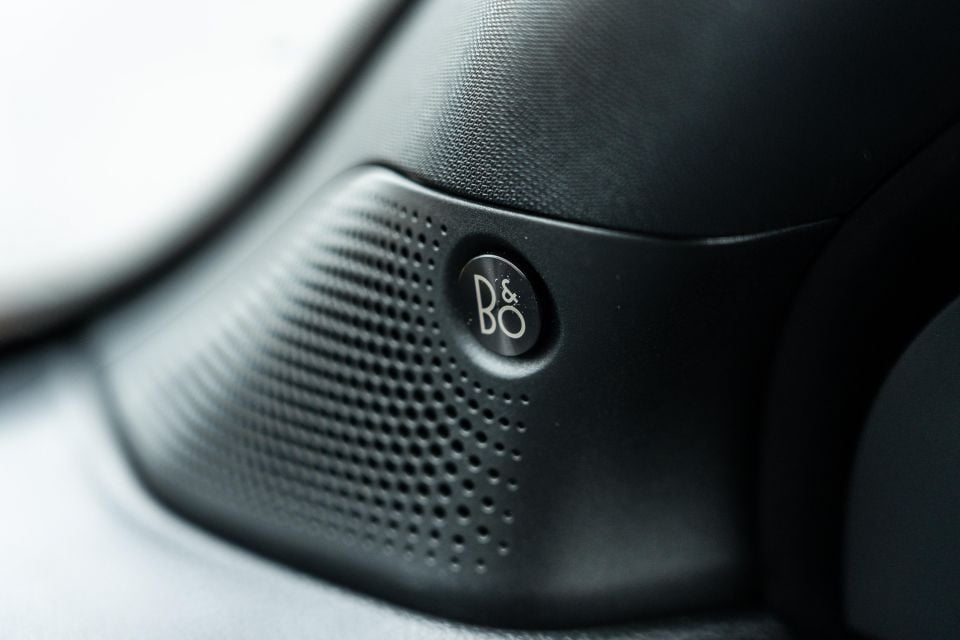
CarExpert brings reviews, research tools and trusted buying support together, guiding you from research to delivery with confidence.
Our tester was also fitted with the Premium Pack ($1500) which adds:
That’s atop a dizzying array of features standard on other models.
For the in-depth pricing and specification breakdown of the entire Ford Ranger line-up, click here.
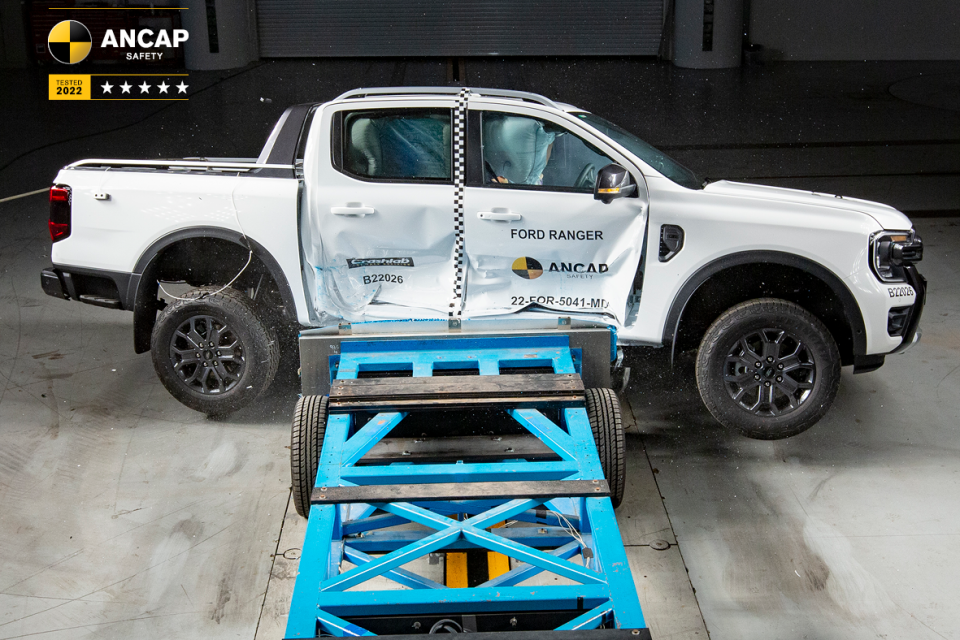
The Ford Ranger earned a five-star ANCAP safety rating on the back of an 84 per cent score for adult occupant protection, a 93 per cent score for child occupant protection, a 74 per cent score for vulnerable road user protection, and an 83 per cent safety assist score.
Standard safety features across the range include:
Other safety equipment such as front parking sensors, adaptive cruise control with stop/go, surround-view camera, and fully-autonomous parking assist are available on higher trim levels.
The XLT adds adaptive cruise, front parking sensors, and fully autonomous parking assist, while the Wildtrak gains surround-view cameras.
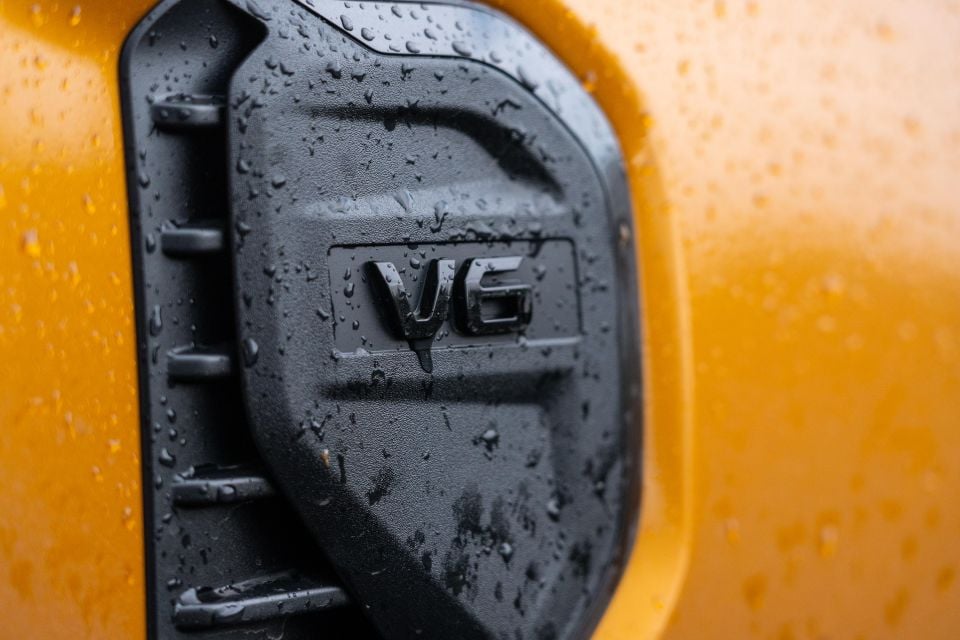
The Ranger is backed by a five-year, unlimited-kilometre warranty like the wider Ford range.
Maintenance is required every 12 months or 15,000 kilometres, and the first five services are priced at $329 under the Blue Oval’s capped-price service program.
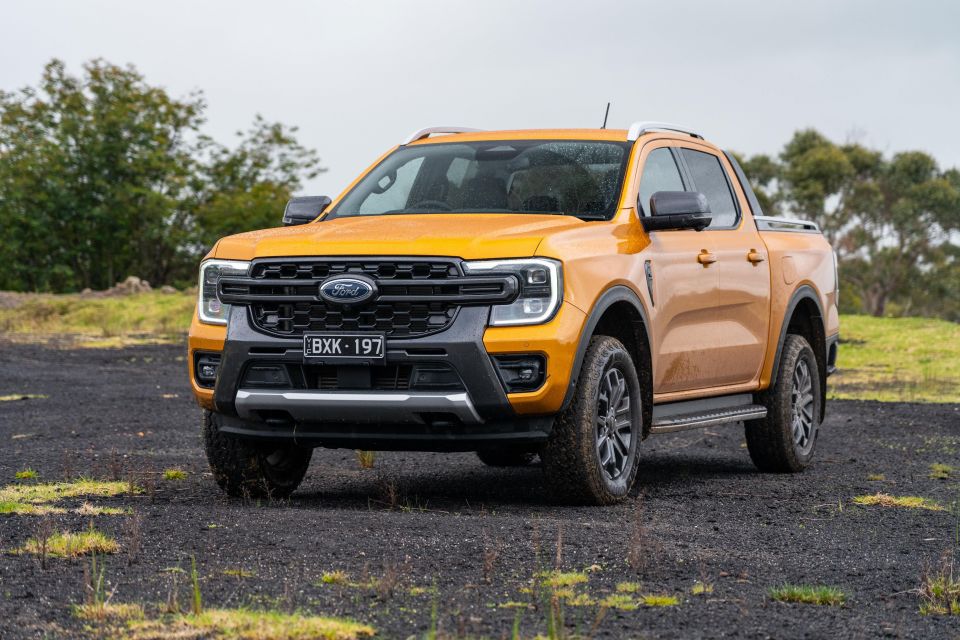
The Ranger has earned praise from all corners since its debut for good reason – it’s expensive, but the Wildtrak V6 is the most complete dual-cab ute I’ve experienced.
It’s a capable, comfortable cruiser on the highway, possesses enough off-road smarts to take amateurs into the wilderness, features an interior that tiptoes the line between usability and flashy modernity, and has the versatility of a tray on the back.
Do you need the Wildtrak? Probably not, given how capable the V6-powered Ranger Sport and XLT already are.
Do you want it? Having spent a very long time behind the wheel, I do.
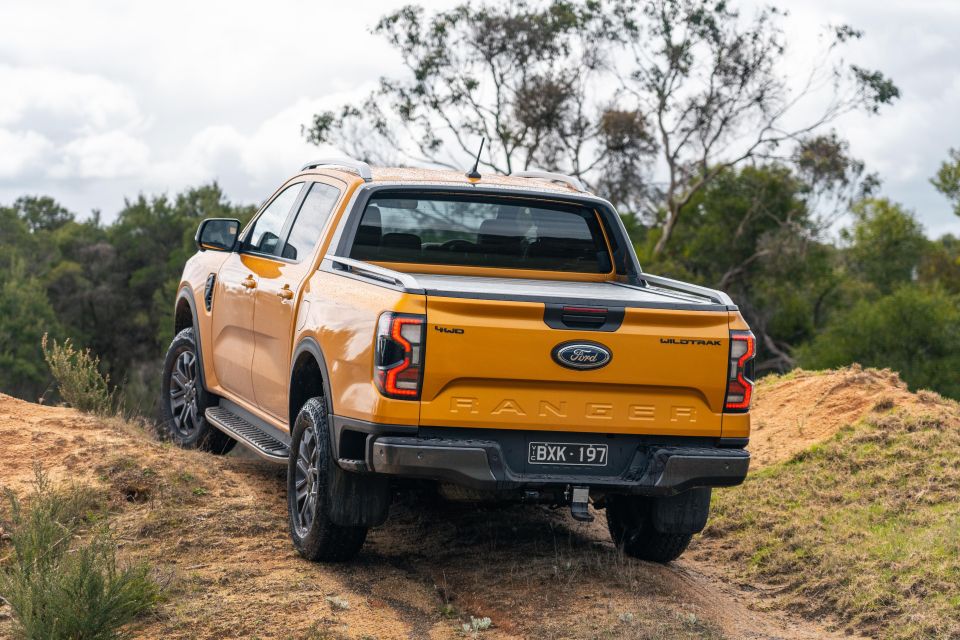
Click the images for the full gallery
MORE: Everything Ford Ranger
CarExpert brings reviews, research tools and trusted buying support together, guiding you from research to delivery with confidence.
Ford Ranger
Ford Ranger Sales rolling 12-months#
*Based on VFACTS and EVC data
Looking for complete Ford Ranger price history?
Our Ford Ranger Pricing Page shows exactly how prices have changed over time.
2026
$37,130
2025
$48,230
2026
$52,990
2026
$53,490
2025
$56,690
2026
$57,880
2025
$57,880
2026
$66,390
2025
$66,390
2026
$69,890
2025
$69,890
2026
$70,990
2026
$75,090
2025
$77,640
2026
$80,890
2026
$82,990
2025
$86,990
2026
$90,690
2026
$95,990
Scott Collie is an automotive journalist based in Melbourne, Australia. Scott studied journalism at RMIT University and, after a lifelong obsession with everything automotive, started covering the car industry shortly afterwards. He has a passion for travel, and is an avid Melbourne Demons supporter.
Add CarExpert as a Preferred Source on Google so your search results prioritise writing by actual experts, not AI.


Damion Smy
6 Hours Ago
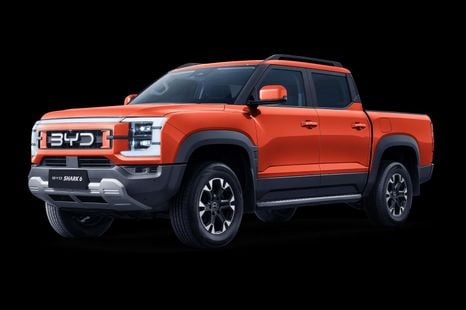

William Stopford
3 Days Ago
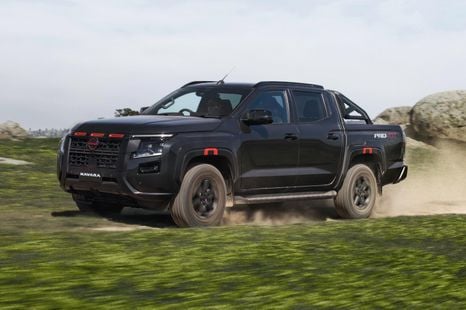

William Stopford
4 Days Ago
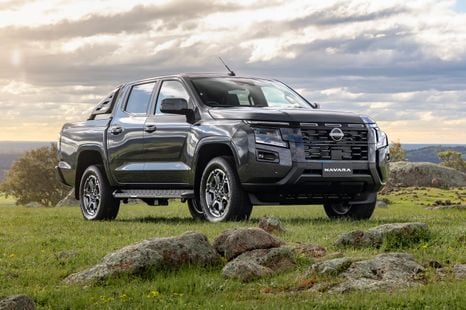

Damion Smy
4 Days Ago
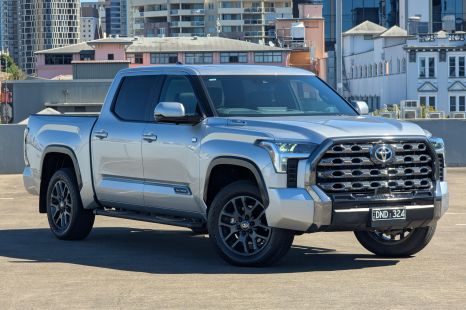

Damion Smy
7 Days Ago
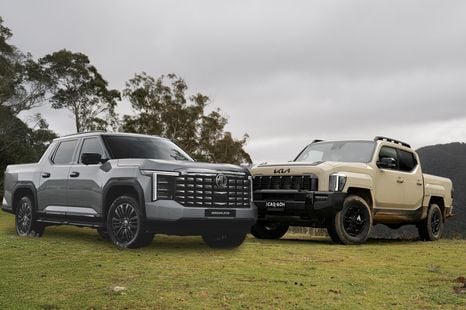

Andrew Maclean
9 Days Ago
Add CarExpert as a Preferred Source on Google so your search results prioritise writing by actual experts, not AI.
* Average savings based on recent CarExpert customer transactions. Actual savings will vary depending on vehicle make and model, location, stock availability, and other factors.
† Displayed prices exclude on-road costs such as delivery charges, registration fees, number plates, insurance and applicable road taxes. These prices are subject to change without notice and may not reflect current market pricing or dealer offers.
 Automotive Vehicle Spec Data & 4K images Powered by JATO Dynamics Ltd
Automotive Vehicle Spec Data & 4K images Powered by JATO Dynamics Ltd